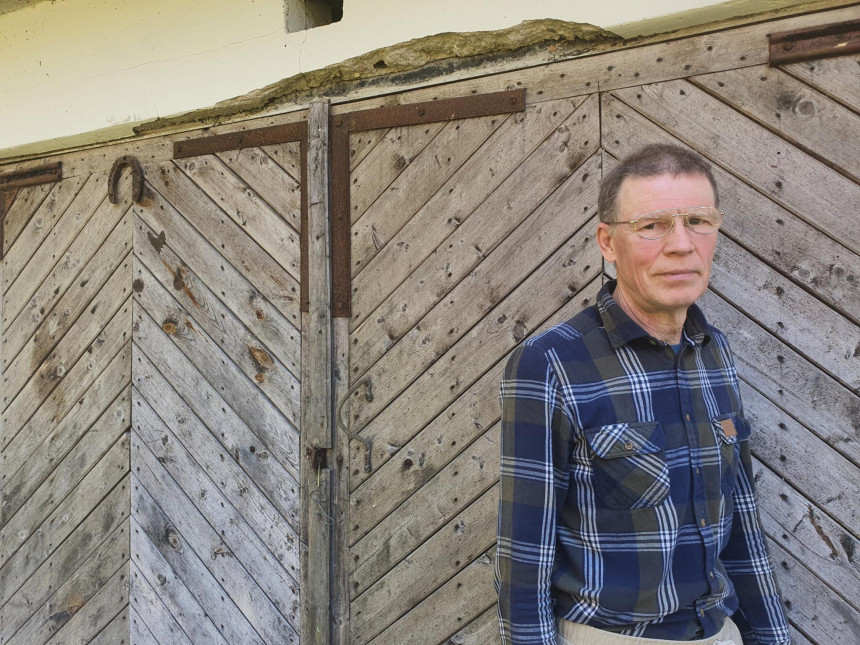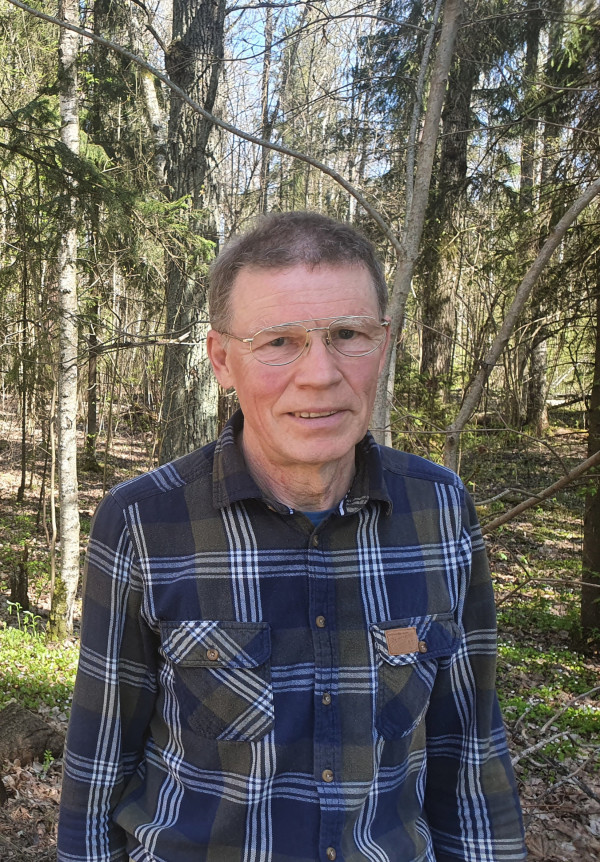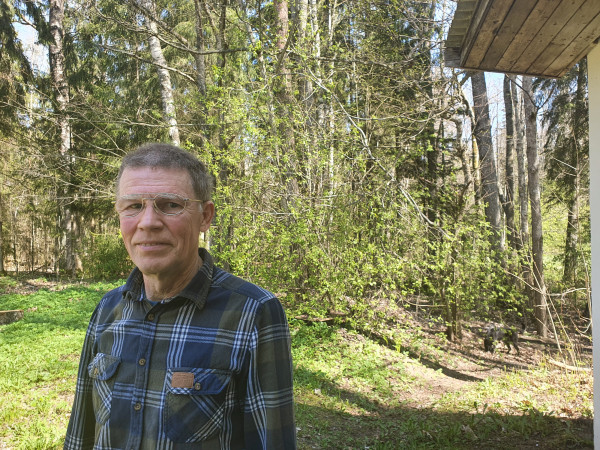Chairman of Ķemeri National Park Fund Andis Liepa: Use your head - to shoot or not to shoot?

"In the territory of Ķemeri bogs during the Soviet years, there was a state hunting model farm, where the government and diplomats hunted. When the independence was restored, it disappeared, this territory remained unhunted, and it should have remained so even when the Ķemeri National Park (ĶNP) was established. Initially, it was – there was no hunting. But everyone really wanted to hunt here... The owners were locals, but a large part of the collectives were the gentlemen of Riga, the necessary people from the ministries, the government and the Saeima,” says Andis Liepa, Chairman of the Board of Ķemeri National Park Fund. Today – an interview with him.
After graduating from the State University of Latvia, Andis Liepa started working on behalf of the Hunting Department of the Ministry of Forestry and Forest Industry of the Latvian SSR. Each republic of the USSR had a plan to start breeding various species of birds, which would then be released into the wild to enrich the hunting fauna. After that, he continued to work in the Hunting Department of the Ministry, but later - in a state hunting farm. "I knew not only the hunting process but also all behind the scenes - how contacts are established, how things are arranged at the state level," says Liepa.
After the independence, Liepa began cooperating with the Latvian Fund for Nature to establish the Ķemeri National Park. And so since 1993, Andis Liepa has been in Ķemeri. The park was established in 1997, when the ĶNP law and regulations were also developed. Andis Liepa was the first director of ĶNP.
In turn, the ĶNP Fund was established in 2000 - as a non-governmental organization under the state organization, namely, under the ĶNP administration. Foreign funds did not give money to state institutions for nature protection, so it was necessary to create a non-governmental organization - the fund.
Andis Liepa is deeply acquainted with the problems of ĶNP, also ones related to hunting. The hunters' lobby has opened the Hunting Law, and it will also affect Ķemeri National Park. The amendments to the law contain a lot of absurdity and egocentrism, which in turn are being fought by conservationists.
The Environmental Advisory Council has developed proposals and comments on the draft law “Amendments to the Hunting Law”, as well as assessments and proposals for the management of specially protected species and specially protected nature territories in Latvia. The amendments proposed by the hunters' lobby do not comply with the Civil Law, endanger property rights and specially protected nature territories, allow the use of hunting gear prohibited by the Habitats Directive, legalize hunting in urban areas. Amendments to the law are planned to be evaluated in the Saeima at the end of May.
You have lived in the territory of Ķemeri National Park for many years, you know how it "breathes." So what about those hunts in the park? In my opinion, it is somehow upside down: the national park needs to be protected, but hunters are hunting in it.
So far, no one in the nature protection system has paid due attention to hunting. In Ķemeri National Park, hunting currently takes place in almost the entire territory, except for small reservation areas (approximately 10%), which no one is even allowed to enter. Although there is currently hunting even there, due to African swine fever. A couple of years ago, with great effort, the ĶNP regulations were adopted, which included two hunting bans on territories where wild horses and Heck cattle graze.
Maybe they have accidentally shot some wild horse or Heck cattle?...
I think some have also been shot intentionally: I have found the legs of cattle in the southern part of the park.
Are these animals allowed to be shot?
Heck cattle have an unclear status in Latvia. We have the idea that one day we will return them to the wild, open landscapes. There are no aurochs in Latvia, no ancestors of horses - tarpans, these animals have been exterminated because their existence contradicted agriculture. Both aurochs and tarpans once came to graze on agricultural land, and they were most often shot there - as the biggest competitors of farmers. Shot them all to extinction...
Heck cattle - although they don't look like aurochs, they are genetically quite close to them. And they would look beautiful in open landscapes, but most importantly - they would maintain the grassland.
Heck cattle are currently kept in enclosures and are not released in the wild. MEPRD does not approve of it.
Why?
There might be problems with farmers...
Man has broken into natural habitats, not the other way around.
Unfortunately, that's how it is. A similar situation exists with the bisons for which Latvian latitudes would be suitable and they could be reintroduced here. And again MEPRD does not accept it.
Seems like it's not the Ministry of Environmental Protection, but the Ministry of Farmers' Protection? Maybe there are no specialists in the field?
There is one hunting specialist in the Ministry of Environment, who lobbies the interests of hunters, being a passionate hunter himself. There are no specialists to discuss ecological issues. There is the Nature Protection Board, but there is also a lack of relevant specialists, and there is a huge staff turnover. In society, on the other hand, attitudes towards hunting are changing, and hunting itself is no longer what it used to be: it was once a source of livelihood. Right now, hunting is actually entertainment, a form of recreation. The hunters say: they are doing a good thing by protecting farmers. But the environment has changed to such an extent that animals no longer have a place to live. We still have forests, but look at what is happening in Western Europe - there are only settlements, agricultural areas and small forest plantations. The surviving animals will come out of the forest, and we need to think about how to organize living together. I see a great deal of controversy on this issue. Hunters say that they protect farmers, but for some reason, they do not want to acknowledge that protected areas might be located next to hunting farms, with a different purpose and methods of managing animals. In their view, hunting farms must be everywhere and shooting must be allowed everywhere.
To make the whole territory of Latvia one large hunting farm?
Yes, something like that, but we can't do without hunting completely: I would say that a very effective way to deter animals is by shooting. Once a hunter has shot someone, the other animals realize it, and then they have fear of man. But in that case, the animals have to be fought where they cause problems, but we are all mixed up in one big mess. Namely, we shoot everywhere, but don't really protect anywhere: we don't have proper hunting farms or proper protected nature areas. The idea of a hunting farm is: the hunter harvests, but shoots just enough animals so that the new crop, so to say, could grow. However, this principle cannot be applied to protected nature territories - national parks. In addition, we want the animals here to not be intimidated. Ķemeri National Park is a huge territory - about five and a half thousand hectares of bogs, surrounded by a huge forest massif. It is a natural complex without settlements and without agriculture. We cannot talk about the damage to forestry either, because clear-cutting is not allowed in the ĶNP, therefore there are no young plants that the animals could destroy. There are no problems, so I see no reason why people should hunt in Ķemeri National Park? On the basis of ĶNP we organize tourism, create nature education, it is also a control area for scientific research. It should be a natural self-regulating area where hunting is not required.
But hunters have opened the Hunting Law.

Then there is an opportunity to discuss it all. At least at the level of regulatory enactments, it is necessary to provide that large protected nature territories - national parks - may not be hunted in. So far, no such opportunity has been given. In the territory of Ķemeri bogs during the Soviet years, there was a state hunting model farm, where the government and diplomats hunted. When the independence was restored, it disappeared, this territory remained unhunted, and it should have remained so even when the ĶNP was established. Initially, it was - there was no hunting. But everyone really wanted to hunt here! The first was the management of the State Audit Office, which managed to "slip in" during the changes and establish its own hunting station. The owners of the nearby hunting stations were locals, but a large part of the collectives were the gentlemen of Riga, the necessary people from the ministries, the government and the Saeima…
At what point was hunting allowed in Ķemeri Park?
Local hunters went to the newly established general director of the Nature Protection Board, and he expanded the territories of local hunter collectives, going as far as the reservation area... On the part of Jūrmala - a new hunting station was built for a new hunting collective and regular hunting was launched in the territory of Jūrmala city. However, the Hunting Law clearly states that hunting in cities is prohibited. Only now ideas are arising about how to edit the law so that hunting could be allowed with the consent of the municipality... but only with the establishment of hunting stations!
What can hunters find in Ķemeri National Park? Are there lynxes and wolves here?
The regulations state that large carnivores cannot be shot in Ķemeri Park. However, we cannot control everything. A few years ago, one wolf had been shot on the edge of the park, and the pups were probably left in the swamp without their mother... For lynxes, it is completely absurd that they are hunted in Latvia at all. The lynx is on the European list of specially protected species, and only with very strict exceptions are people in the EU allowed to hunt it.

I would like to think that lynxes in Latvia are not moving towards becoming extinct, but the counting methods are different, and some have three times more lynx than others... This is not normal, and therefore lynx should not be hunted, because there is no reason to believe that the lynx population is in good condition. None of the conditions under which lynx could be hunted corresponds to the situation in Latvia. These are: if the animal is a threat to human life and health, if there is a threat to agriculture or forestry. There are no such things from a lynx.
But what about wolves?
Wolves reproduce faster, they can harm livestock farmers. But if you want to solve something, you have to get to the root of the problem, not let people go around shooting wherever they want. A wolf can come to the village, steal a dog or cat from the yard, and it is not pleasant that a predator walks in your backyard. The second problem - farm animals, most often - sheep. They live near homes or in animal housing. A wolf can come to these places. Well, then, go ahead - hunt near home, where the wolf comes to steal the sheep, not where the wolf lives in its environment, deep in the forest, do not drive it out of there! Two absurd things: firstly, the shooting does not take place in places where there is damage, thus reducing the wolves' desire to approach humans. Secondly, the problem is exacerbated by the non-selective shooting of an animal that has never even come out of its environment because it is strong, healthy and able to hunt deer in the forest. On the other hand, when hunting near home, a predator who is a real threat to domesticated animals will be shot. Then a healthy wolf population will remain in nature, fulfilling its ecological function.
People like to imagine that without their "smart" intervention no ecological function will be performed... Perhaps the best thing would be to engage in prevention - so that carnivores do not have the opportunity to come and steal, for example, sheep?
Regarding European protected species, the situation must be controlled. Firstly, the principles set out in Europe must be complied with, namely that preventive measures must be taken to prevent the forest animal from entering the yard. Of course, big fences can't be built everywhere, and electric fencing doesn't do much. Well then, farmer, go and sit next to your flock and wait for the wolf. And then shoot. In the case of ungulates, they will reproduce as long as there are sowings and crops, i.e., as long as there is a food base. But carnivores are the ones who also help regulate the number of ungulates - not just the food base.
The amendments to the Hunting Law stipulate that hunters will be allowed to go anywhere, even in those areas for which they have not obtained an agreement with the landowner. How is that possible?
The law does not say this unequivocally: it will be regulated by the regulations of the Cabinet of Ministers. But no one knows what they will be and how they will regulate this. But listening to the podcasts of hunters and reading their articles, it is clear that they think: that's what will happen! The same Saeima deputy Kazinovskis naively asks: and why wouldn't it? Say, the landlord is away somewhere, why should we search for him? Why shouldn't we hunt there? However, Article 935 of the Civil Law cannot be circumvented: it clearly states that a private owner has the right not to allow hunting on his land. May God give that MEPRD can finally start thinking about these hunting things. So far no one there has thought about it, at best you get a confused silence. In the worst case - there is someone who lobbies hunters and claims that you can't do without hunting.
For the most part, hunting is a hobby.
For the most part, it is. That's how men relax. It is partly understandable: men do not have such socialization opportunities as women - beauty salons, esoteric clubs, crochet groups (laughs)... Men only have to meet, chat, talk about business and go hunting. Then - show off their deer antlers.
Let them show off their own. And those women - animal shooters... Just dreadful.
Yes, we have women who see life from a more masculine perspective. But everyone - including women - has to use their head: to shoot or not to shoot.